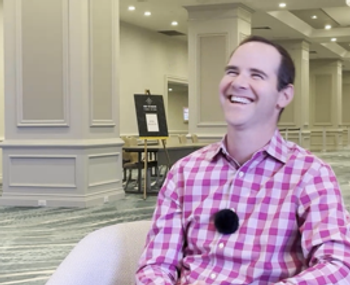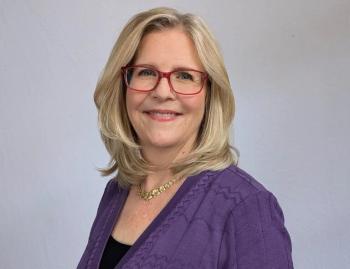
A Doctor, Her Daughter, and a Difficult Dilemma
What happens when a clinician has to give herself news she does not want to hear?
My 18-year-old daughter has severe autism. She was doing relatively well at an
One evening, my daughter was sitting on the couch. Suddenly, she got up, forcefully hit herself in the head with her hands, ran upstairs into my room and thrust herself over my bed, banging her head into the mattress. Then she started chasing and trying to attack me. In fear, I locked myself in the bathroom. After what I perceived to be 5 minutes, I came out—only to find her drinking hand sanitizer. I removed it. She calmed down and went to the basement to play on her swing, laughing and giggling as if nothing ever happened. Her nose and mouth were bleeding, but she showed no signs of distress. That night, she fell asleep early and slept through the night, again as if nothing ever happened.
The next day, the dentist told me that my daughter had broken her frenulum. Had her hand been positioned slightly differently, she would have fractured her teeth. That is when I started to ask myself if I should be keeping her at home. Had a patient’s parent reported to me a similar experience with their child, I would have recommended
I am no stranger to autism, its impact on the family as well as on the individual. My identical twin brothers also have autism. My brother banged his head so hard that he needed surgery, intravenous antibiotics, and 5 months of medical hospitalization. We were so relieved when a residential school accepted him. That was not a hard decision, given its antecedents. He has been doing well since, off medications for over 30 years, working and going on trips.
Typically, it upset me when parents rejected my recommendations for residential educational placement with applied behavior analysis. Some parents would not let go despite the dangers at home. While I always tried to be empathetic, sometimes I saw them as selfish because they did not put their child’s needs first. Yet with my daughter, it was different. I often second-guessed myself, wondering if I was doing it for myself or for my daughter, maybe choosing this because subconsciously I wanted a life of my own and had tired of watching every dime while paying for autism school tuition and home therapies.
“Was I exaggerating her behaviors?” I asked myself, wondering if I was inventing excuses to send her away. I worried that she would not understand that I planned to visit often. Maybe she would wonder if we would ever see one another again. I had nightmares about sending her away. Still, I knew I could not keep her safe at home.
One morning, my daughter bit the bus driver. Yes, the same daughter with the beautiful smile and giggles. Still unable to decide, I called a friend who works in mental health, requesting reassurance.
I kept resisting what I knew was the right decision, even after a board-certified behavior analyst evaluated her and assured me that this was the best decision available for bad circumstances. My self-doubt persisted. Was my concern about potential traumatic brain injury exaggerated, even unfounded? How could I, a parent, be objective with my own child? Yet when I showed a video to my daughter’s developmental pediatrician, she, too, agreed. How much more reassurance did I need?
While all this was transpiring, my black and blue marks from my daughter’s aggression remained. There were still more stories to tell. Once, when she was applying her deodorant, she started to squeeze me hard. I backed away—and she ate her deodorant. Her pica had been constant in the past. It had improved with applied behavior analysis, and now occurred only every few months. Yet even one-off behavior can be life-threatening, and I was helpless to stop her.
When the pandemic began, schools closed. Life became a nightmare. My husband had heart surgery. My daughter’s community habilitation worker quit. With no one to care for my daughter, I postponed my own doctors’ appointments. Without school, she regressed, staying up at night, giving herself bloody noses, attacking me and my husband, and running out of the house.
With my daughter’s school closed, I found myself providing most of the therapy, but I was alone, without the full crisis team available at school. When she once again attacked me while I was following the school directed curriculum, I was forced to lock myself in the bathroom out of fear. I did not want to activate
Patients meet my daughter
During the pandemic, I could practice psychiatry only a few hours a week. One time, while evaluating a patient, my daughter bit me. While her teeth were in me, I cursed, for the first time ever on the job. I was very embarrassed. In a role reversal, the patient asked me if I were okay.
At the end of a session, a patient was annoyed with the background noise. I apologized and told her that my daughter has autism. Afterwards, I started my sessions with, “If you hear loud noises, I apologize in advance. My daughter has autism.”
I hired a sitter but sometimes even the sitter needed help in managing my daughter’s behaviors. Once she ran up the basement stairs, ahead of the sitter. I interrupted my session with a depressed patient to redirect her out of the kitchen, where she might eat soap or a banana peel. The patient started laughing. When I commented about her laughter, the patient seemed embarrassed and explained that she was not laughing at my daughter, but at what I said, “It’s good you can laugh,” I replied, “A lot of people with depression can’t.”
After I abruptly interrupted sessions due to self-injury or aggression on the part of my daughter, some patients empathized with me, saying, “It must be hard,” or “You have a lot of problems.” At the beginning of sessions, some patients would ask, “How is your daughter?” I would give some nonspecific yet truthful answer like, “She’s hanging in there, one day at a time,” and redirect to how the patient was doing. I found it very hard to focus on the job. For the first time I could remember, it took great effort to remain professional and patient with my patients. I had urges to say rude things. It was exceedingly difficult to serve my patients after my daughter had just attacked me, and after I had a night of disrupted sleep.
During my daughter’s 3 and a half months out of school, I lost 5 pounds and was extremely sleep deprived. There were times I was so unfocused, I put napkins in the refrigerator and even a metal pot in the microwave. Fortunately, I noticed the sparks before anything happened.
Yet there was a silver lining to COVID-19. Unlike her teachers, on some programs, I had felt frustrated with her slow progress, but then I discovered that she knew all the letters by sound and recognized a few words by sight. I taught her to request her favorite foods by handing me the word. I learned how to turn every activity of the day into a learning experience.
When I finally decided to place my daughter in residential care, I felt guilty for not spending more time with her before she left. Now, after COVID-19, I will never feel that way again. We have some great memories from our time at home, and she is happy in her new environment. In fact, she has adjusted better than I did. I now know that we, as psychiatrists, must not only recommend residential placement for safety, but we must also reassure guilt-ridden and self-doubting parents that they are acting in their child’s interests.
Ilana Slaff-Galatan, MD is a practicing psychiatrist in Queens, NY. She completed a fellowship in autism research and is the author of authored “Don’t Medicate–Educate! One Family, Three Cases of Autism, Safe Treatment for Dangerous Behavior.” More information can be found on her website
Newsletter
Receive trusted psychiatric news, expert analysis, and clinical insights — subscribe today to support your practice and your patients.







